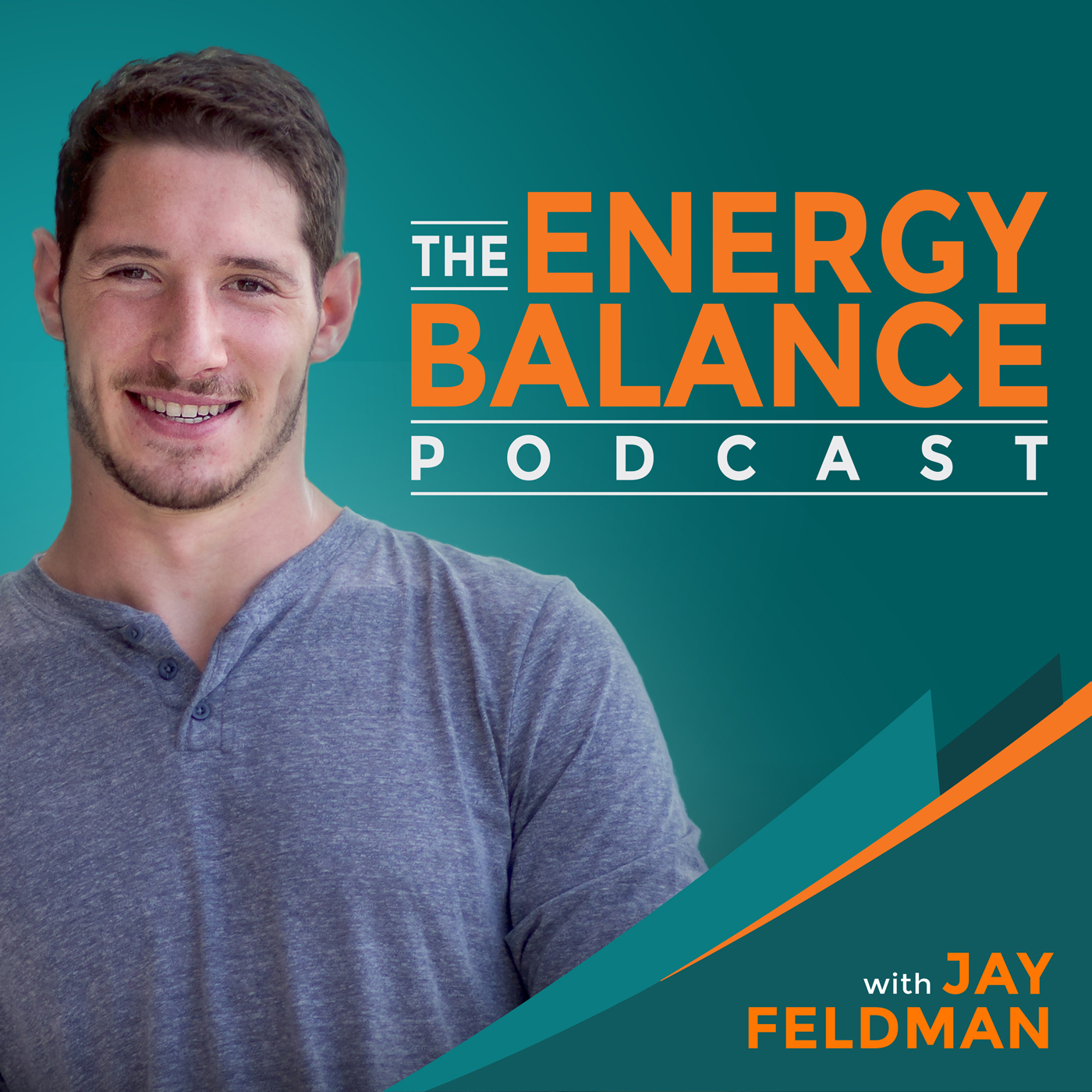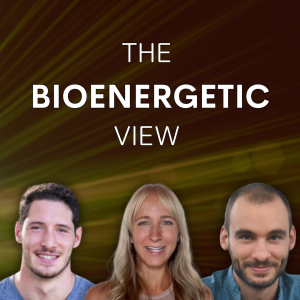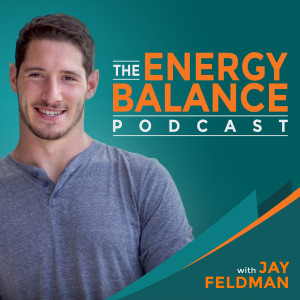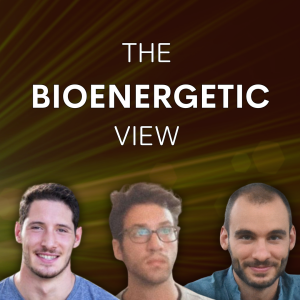
913.7K
Downloads
169
Episodes
Discover how you can live without constant hunger and fatigue, brain fog, poor sleep, and other low-energy symptoms. The Energy Balance Podcast will teach you how to maximize your cellular energy so you can take back your health and finally experience clear-headed focus, restful sleep, and all-day energy you didn’t think was possible.
Discover how you can live without constant hunger and fatigue, brain fog, poor sleep, and other low-energy symptoms. The Energy Balance Podcast will teach you how to maximize your cellular energy so you can take back your health and finally experience clear-headed focus, restful sleep, and all-day energy you didn’t think was possible.
Episodes

Thursday Jun 26, 2025
Thursday Jun 26, 2025
- Dr. Ken Berry’s claim that humans would historically only eat sweet foods (like fruit and honey) 1-2 weeks out of the year
- Whether we should always do what our ancestors did to optimize our diets
- Dr. Ken Berry’s claim that fructose causes glycation
- Whether we can trust AI to provide accurate information
Free Energy Balance Food Guide: https://jayfeldmanwellness.com/guide
The Nutrition Blueprint: https://mikefave.com/the-nutrition-blueprint/
Theresa's Instagram: https://www.instagram.com/livingrootswellness/
Timestamps:
0:00 – intro
0:38 – Dr. Ken Berry’s claim that humans historically ate fruit and honey to gain weight like bears for the winter
3:45 – whether fructose and fruit are responsible for weight gain in bears and whether this applies to humans
8:53 – whether humans evolved eating a high-carb diet
11:30 – what about carbohydrate consumption in native human cultures and ancestral environments?
17:27 – Dr. Ken Berry’s claim that fructose is 10x more glycating than glucose
20:51 – whether sugar and carb consumption cause high blood sugar and AGEs (advanced glycation end products)
27:05 – how low-carb diets can increase glycation and AGEs
32:22 – blood glucose and hemoglobin A1C are often higher on low-carb diets than on diets that include healthy carbohydrates
33:41 – how keto diets cause glycation and increase AGEs
37:41 – what really influences hemoglobin A1C levels
44:32 – the importance of finding optimal carb sources – why candy is not the same as fruit
45:43 – problems with hyper-focusing on one single lab value
48:18 – Dr. Ken Berry’s claim that there is no way to test whether fructose is causing glycation
54:05 – regulating blood sugar for type 1 diabetes
59:01 – is glycation happening in the background on a high-carb diet even if your health is improving?
1:00:17 – can we trust AI like Grok and ChatGPT to provide accurate health information?
1:07:42 – debunking Grok’s logic on carb vs. fat efficiency as a fuel source
1:13:16 – how to properly use AI – DON’T use it to replace your own thinking
1:18:01 – Grok is wrong about fat being a more efficient fuel source than carbs
1:22:33 – strategies for understanding complex research papers
1:24:14 – using personal experience and logic as a guide toward optimizing health
1:32:35 – the gratification that comes with the process of true learning

Thursday Jun 12, 2025
BV #12: Gary Brecka Doesn’t Understand Thyroid & Natural PUFA vs. Seed Oils
Thursday Jun 12, 2025
Thursday Jun 12, 2025
- Gary Brecka’s misrepresentation of thyroid function – are thyroid hormones methylated?
- How thyroid hormone conversion actually works and the factors that can inhibit it
- Whether taking thyroid hormone replacement suppresses or harms your thyroid gland
- Seed oils vs. unprocessed PUFA from nuts and seeds – is there a difference?
- Whether PUFA are “essential” and if there are actually any benefits to consuming them
Free Energy Balance Food Guide: https://jayfeldmanwellness.com/guide
The Nutrition Blueprint: https://mikefave.com/the-nutrition-blueprint/
Theresa's Instagram: https://www.instagram.com/livingrootswellness/
Timestamps:
0:00 – intro
1:21 – Gary Brecka’s claim that methylation is responsible for T4 to T3 conversion
5:43 – how T4 to T3 conversion really happens and factors that inhibit it
10:17 – whether a lack of T3 is the primary problem in Hashimoto’s thyroiditis
12:53 – whether taking exogenous thyroid medications harms the thyroid gland
18:19 – Gary Brecka’s advice on how to fix Hashimoto’s and why we disagree
24:14 – be careful of quick fixes and magic pills
26:38 – pros and cons of using thyroid hormone replacement therapy
30:17 – issues with thyroid supplementation recommendations within the Bioenergetic sphere
37:38 – whether you can reverse hypothyroidism without using thyroid supplementation
41:31 – Joe Rogan and Gary Brecka discuss why the processing of seed oils is responsible for their harm
47:30 – whether processed foods are inherently bad
49:23 – are there any benefits to eating PUFA and are they “essential”?
52:28 – the toxic effects of PUFA, including from nuts & seeds
55:19 – potential benefits from nuts & seeds are not due to PUFA content

Thursday Jun 05, 2025
Thursday Jun 05, 2025
- Gabrielle Lyon’s claims about carbohydrate disposal, “earning our carbs”, and balancing carbs with muscle
- Whether the body’s ability to make glucose through gluconeogenesis means that we don’t need to consume carbohydrates
- How cold plunging may calm the nervous system by first triggering excessive stress, and whether that’s worth it
- Whether the benefits of cold exposure outweigh the costs, and how to gauge when stressors like exercise become too much
Free Energy Balance Food Guide: https://jayfeldmanwellness.com/guide
The Nutrition Blueprint: https://mikefave.com/the-nutrition-blueprint/
Theresa's Instagram: https://www.instagram.com/livingrootswellness/
Timestamps:
0:00 – intro
0:45 – Gabrielle Lyon on the amount of carbohydrates we can “dispose of” in a meal
8:52 – whether Gabrielle Lyon’s claim that excess carbohydrates turn into fat is valid
12:39 – do we need to “earn our carbs” with exercise?
18:32 – how upregulating gluconeogenesis by not consuming carbohydrates drives insulin resistance
21:27 – do low-carb high-protein diets support skeletal muscle health?
22:56 – strategies for adjusting macronutrients to fit your individual needs
29:24 – how to shift away from low-carb diets, focusing on what’s optimal rather than minimum requirements
31:44 – optimal carb intake for muscles and general health
34:57 – applying Ray Peat’s “perceive, think, act” process to optimize our diets
39:29 – the difference between parroting information and thinking critically
43:20 – cold plunging calms the nervous system by first driving excessive stress
48:36 – the cumulative effects of stressors like cold plunging and the risks associated with them
53:41 – whether the benefits of cold exposure outweigh the costs and how much stress is too much
56:28 – how hormesis works and whether the dose makes the poison
1:01:34 – what is stress and how do we prevent it?
1:05:09 – how to get the same benefits without using hormetics like fasting, Wim Hof breathing, and cold exposure
1:10:35 – does reaching a goal have to be difficult or stressful?

Tuesday May 27, 2025
Tuesday May 27, 2025
- How the sugar diet, honey diet, and other similar diets actually work and whether FGF21 is really responsible for their benefits
- How you can lose weight while eating sugar and without sacrificing your health
- The side-effects of the sugar diet and how to modify the diet to prevent those effects
- The surprising effects of the sugar diet on testosterone, digestion, and bone health
- Whether you’ll lose muscle on a low protein diet like the sugar diet
- Whether you shouldn’t be eating carbs and fats together due to the Randle cycle
Check out the Energy Balance Mini-Course here: https://www.jayfeldmanwellness.com/energy/
Check out the Energy Balance Food guide here: https://www.jayfeldmanwellness.com/guide/
Check out the Energy Balance Solution program here: https://www.jayfeldmanwellness.com/solution/
Click here to check out the show notes:
https://www.jayfeldmanwellness.com/eb-134-the-sugar-diet-lose-fat-and-increase-your-metabolism-without-losing-muscle-mass
Timestamps:
0:00 – intro
1:08 – FGF21 summary: increasing metabolism at a cost
4:06 – how the sugar diet, honey diet, and other similar diets actually work
10:03 – low-fat diets improve insulin sensitivity, even without protein restriction or FGF21 upregulation
17:50 – whether very low protein diets are ever beneficial and whether they always lead to muscle loss
25:54 – protein recommendations for insulin sensitivity, weight loss, and kidney function
29:07 – using the sugar diet for rapid weight loss or “getting shredded”
32:13 – sugar diet concerns: bone loss, infertility, stunted growth, muscle loss, metabolic suppression, weight regain, and nutrient deficiencies
35:53 – will eating protein with dinner prevent the negative effects?
36:28 – blood sugar instability, sleep issues, and excess glucagon on the honey diet and sugar diet
40:17 – Randle Cycle misconceptions: do you need to separate carbs and fats
44:50 – how low-fat diets work to improve glucose metabolism and misapplications of the Randle cycle
48:17 – low-fat diets and hormones: low testosterone and DHT levels in men
49:22 – the sugar diet and digestion: SIBO, impaired liver detoxification, low bile flow, and endotoxin
53:52 – is the sugar diet too restrictive? Is it sustainable?
59:57 – how to modify the sugar diet to reduce the negative effects
1:02:23 – how to achieve lasting weight loss while improving long-term health
![[Mini Episode] Sugar Diet & FGF21 Simplified: Muscle Loss, Stress, and Weight Regain](https://pbcdn1.podbean.com/imglogo/image-logo/3934450/The_Energy_Balance_Podcast_1400x1400_300x300.jpg)
Thursday May 22, 2025
[Mini Episode] Sugar Diet & FGF21 Simplified: Muscle Loss, Stress, and Weight Regain
Thursday May 22, 2025
Thursday May 22, 2025
Download the free Energy Balance Food Guide: https://www.jayfeldmanwellness.com/guide/
Sign up for a free call for help with weight loss and other health issues: https://www.jayfeldmanwellness.com/call/
Timestamps:
0:00 – intro
1:20 – overview of FGF21 and how it gets triggered
6:40 – FGF21 works via stress, turning down metabolism and leading to weight regain
11:30 – will the sugar diet cause negative effects if only used short-term?
21:44 – does eating protein at night prevent the negative effects?
27:18 – the negative effects only occur in the research after long-term FGF21 upregulation

Tuesday May 20, 2025
EB. 133: The Sugar Diet/Honey Diet and FGF21: The Research
Tuesday May 20, 2025
Tuesday May 20, 2025
- What are the sugar diet and other related diets like the honey diet, fairy princess diet, and fruit till noon diets
- Whether FGF21 is responsible for the weight loss seen on these diets
- The effects of the sugar diet on muscle mass
- Whether FGF21 really extends lifespan
- How to increase FGF21 levels and whether it’s really good for your health
Check out the Energy Balance Mini-Course here: https://www.jayfeldmanwellness.com/energy/
Check out the Energy Balance Food guide here: https://www.jayfeldmanwellness.com/guide/
Check out the Energy Balance Solution program here: https://www.jayfeldmanwellness.com/solution/
Click here to check out the show notes:
https://www.jayfeldmanwellness.com/eb-133-the-sugar-diet-honey-diet-and-fgf21-the-research/
Timestamps:
0:00 – intro
1:00 – the sugar diet, honey diet, fairy princess diet, and fruit-till-noon diets as discussed by Cole Robinson, Mark Bell, Anabology, Noah Ryan, celestialbe1ng, and others
6:35 – my experience on a high-sugar diet and what the sugar diet means for the health world
11:17 – what is FGF21?
15:54 – how low-protein diets trigger the release of FGF21
20:00 – the context of FGF21 on low-protein diets and the reasons for its effects: is this really beneficial?
26:15 – the long-term effects of FGF21 on body fat, muscle mass, and metabolic health
33:16 – how the sugar diet compares to low-carb diets
35:55 – high-carb low-protein diets vs. high-fat low-protein diets on FGF21
37:34 – low-protein diets increase your metabolism due to stress: brown fat, uncoupling, and energy expenditure
43:59 – FGF21’s role in stress, energy conservation, and hibernation
49:56 – FGF21 and cortisol: is FGF21 a stress hormone?
54:09 – FGF21 and hormesis: is FGF21 hormetic?
56:10 – FGF21 and liver fat production go hand-in-hand
59:11 – carb-induced increase in FGF21 is activated by reductive stress
1:05:04 – the role of FGF21 in de novo lipogenesis as an adaptive response to stress
1:10:47 – carb-induced FGF21 causes fat gain and sympathetic activity
1:14:29 – does FGF21 cause metabolic syndrome, diabetes, NAFLD, cardiovascular disease, and obesity?
1:21:08 – does FGF21 extend lifespan? if so, is it worth it?
1:27:03 – can you lose weight and extend lifespan without a protein-deficient diet?

Tuesday May 13, 2025
EB. 132: You've Been Lied to About Fructose
Tuesday May 13, 2025
Tuesday May 13, 2025
- Whether Robert Lustig is right about fructose being a poison
- What Robert Lustig completely misses when comparing the biochemistry of glucose, fructose, and alcohol
- Whether a low-fat, high-carb diet actually causes fatty liver
- The research on fructose and it’s toxicity
- Whether you should be minimizing fruit juice intake in the form of fruit, fruit juice, and honey
Check out the Energy Balance Mini-Course here: https://www.jayfeldmanwellness.com/energy/
Check out the Energy Balance Food guide here: https://www.jayfeldmanwellness.com/guide/
Check out the Energy Balance Solution program here: https://www.jayfeldmanwellness.com/solution/
Click here to check out the show notes:
https://www.jayfeldmanwellness.com/ep-132-youve-been-lied-to-about-fructose/
Timestamps:
0:00 – intro
1:01 – Robert Lustig’s claims that fructose is a poison
5:50 – what Robert Lustig misses when it comes to glucose, the “good carbohydrate”
12:05 – what’s really responsible for the toxic effects of alcohol
16:53 – Robert Lustig's claim that fructose can’t be converted to glycogen is false [Robert Lustig’s fructose lies begin]
20:50 – whether fructose is inherently toxic in the liver
24:22 – the research showing that Robert Lustig is wrong about fructose
32:40 – whether fructose is really different from glucose in terms of its effects at the liver
35:51 – key factors missing in fructose research – endotoxin, PUFA, and rat research
41:22 – average fructose intakes are far below the amounts that are typically used in research
43:41 – whether Robert Lustig is right that fructose causes more fat production than glucose
49:35 – whether fructose (or carbs in general) cause fatty liver disease
52:15 –low-carb, high-fat diets trigger the exact mechanisms Dr. Lustig blames on fructose
1:00:59 – what really causes fatty liver disease
1:04:20 – should we avoid fructose-containing foods to fix fatty liver disease? Is soda and candy the answer?

Tuesday May 06, 2025
Tuesday May 06, 2025
- The Holistic Psychologist’s claim that psychiatric disorders stem from metabolic dysfunction and whether we agree with her solutions
- Whether Layla Al-Naif is right that sugar is as addictive as a drug
- The difference between table sugar and natural sugar sources
- Whether it’s possible to live a healthy life without starch
Free Energy Balance Food Guide: https://jayfeldmanwellness.com/guide
The Nutrition Blueprint: https://mikefave.com/the-nutrition-blueprint/
Theresa's Instagram: https://www.instagram.com/livingrootswellness/
Timestamps:
0:00 – intro
0:44 – the brain's high energy demands and how metabolic dysfunction drives poor brain health
4:19 – are anxiety and depression caused by chemical imbalances in the brain?
7:05 – recognizing insulin resistance as an inability convert glucose to energy
9:42 – whether blood sugar spikes and crashes cause fatigue, brain fog, and psychiatric disorders
11:53 – our take on the Holistic Psychologist’s recommendations for stabilizing blood sugar
18:01 – what really interferes with brain energy metabolism – is it just sugar?
24:57 – refined sugar vs natural sugars such as honey, maple syrup, coconut sugar, and date syrup
30:55 – whether sugar is addictive
33:50 –fat triggers the same reward centers in the brain as carbohydrates
36:34 – how Jay & Mike fixed their sugar cravings from keto and low-carb
39:56 – whether eliminating starch is healthy long-term
44:34 – the negative impact of carnivore diets on gut health
50:16 – tips for recovering from the stress of carnivore and the importance of experimentation
53:46 – how much sugar and starch Jay, Mike, and Theresa eat

Thursday Apr 24, 2025
Thursday Apr 24, 2025
- Anthony Chaffee’s view that ketosis is the natural state for animals and humans
- Whether LMNT is a scam
- Whether we should be getting vitamin D from our food and how that fits with a low-PUFA diet
Free Energy Balance Food Guide: https://jayfeldmanwellness.com/guide
The Nutrition Blueprint: https://mikefave.com/the-nutrition-blueprint/
Theresa's Instagram: https://www.instagram.com/livingrootswellness/
Timestamps:
0:00 – intro
0:22 – meet Theresa Piela
4:20 – emotional health as an underappreciated Bioenergetic factor
11:03 – is Anthony Chaffee right about ketosis being our natural state?
13:12 – is ketosis is the natural state for humans?
18:57 – is ketosis is the natural state for animals?
24:22 – whether bacteria can serve as a protein source in animals
28:04 – whether ketosis is a natural healthy state rather than a starvation state
32:11 – the potential benefits of ketones are misinterpreted as evidence that ketosis is ideal
34:24 – the appeal of “naturalism” – just because something is natural, does that make it healthy?
36:44 – is LMNT a scam?
44:37 – whether we should always add electrolytes to our drinking water
45:45 – Robb Wolf’s claim that insulin drives aldosterone production
51:08 – stevia and allulose vs. sugar
55:42 – whether we should be getting vitamin D from our food
1:00:04 – how to properly supplement with vitamin D and the importance of calcium, magnesium, and vitamin K2
1:04:18 – how vitamins E, K2, and A relate to vitamin D
1:08:56 – the benefits of UVB and red light, and what to do to prevent aging skin
1:14:19 – can applying cholesterol topically boost sun benefits?

Tuesday Apr 15, 2025
EB. 131: Should You Be Avoiding High Oxalate Foods? How To Fix Oxalate Issues
Tuesday Apr 15, 2025
Tuesday Apr 15, 2025
- The impact of sugar consumption on oxalate production
- Whether you really need to avoid all high oxalate foods
- Different cooking and preparation methods to reduce oxalate exposure
- Which supplements can make oxalate issues worse
Check out the Energy Balance Mini-Course here: https://www.jayfeldmanwellness.com/energy/
Check out the Energy Balance Food guide here: https://www.jayfeldmanwellness.com/guide/
Check out the Energy Balance Solution program here: https://www.jayfeldmanwellness.com/solution/
The Nutrition Blueprint: https://mikefave.com/the-nutrition-blueprint/
Click here to check out the show notes:
https://www.jayfeldmanwellness.com/ep-131-whether-to-avoid-high-oxalate-foods-and-how-to-fix-oxalate-issues/
Timestamps:
0:00 – intro
0:53 – whether fructose contributes to increased oxalate production
3:42 – is sugar the culprit behind oxalate issues?
9:14 – the problems with the research demonizing fructose
14:45 – the optimal amount of dietary oxalate and how to determine whether oxalates are an issue for you
17:57 – the importance of testing, experimentation, and listening to your symptoms
25:10 – how to reduce your exposure to high-oxalate foods
32:02 – the best cooking methods to reduce oxalates in food
37:05 – foods highest in oxalates and whether salads are OK to eat
40:17 – oxalate content in raw cacao vs chocolate
45:26 – whether you need to avoid soybeans, potatoes, sweet potatoes, cassava, beets, and carrots due to their oxalate content
49:05 – examples of bioenergetic diets with varying oxalate content
57:01 – other dietary considerations for oxalate issues (PUFA, collagen, vitamin C, calcium, magnesium, carbohydrates, protein, and fat intake)
1:06:22 – the best supplements to fix your oxalate issues
1:11:45 – which supplements can make oxalate issues worse and whether to take probiotics for oxalate issues
1:14:58 – the long-term impact of carnivore diets on liver and gut health
